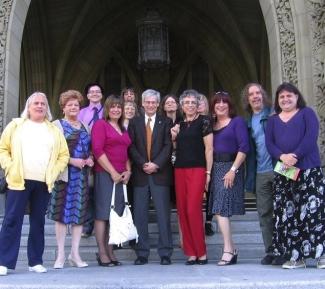NDP MP Bill Siksay’s trans rights bill passed second reading in the House of Commons on June 8 after the government declined to take a recorded vote on the issue.
“It is going to committee, and I feel great,” says Siksay. “It’s taken a long time — it’s been six years of work by lots of folks across Canada, lots of activists, lots of people took personal initiatives, and it’s very exciting that we’ve reached this spot.”
Siksay’s C-389 would add gender identity and gender expression as prohibited grounds of discrimination to the Canadian Human Rights Act. The private member’s bill would also amend the hate crime and sentencing provisions of the Criminal Code.
On June 8, MPs from all three opposition parties rose in support of the bill, while the parliamentary secretary for the minister of justice, Daniel Petit, gave the government position that the bill was unnecessary because trans people are already protected from gender-based discrimination in existing laws.
Speaking for the Liberals, gay MP Mario Silva quoted imprisoned Burmese leader Aung San Suu Kyi, saying “Please use your freedom to promote ours.” Silva’s message was of human rights, saying no minority was too small to be denied the protection of the law.
Also speaking for the Liberals was Vancouver Centre MP Hedy Fry, who related her experiences as a physician as to the physical and psychological costs of discrimination. Fry also noted that because gender identity is a medical diagnosis, it entitled trans people to full healthcare under the Canada Health Act, which was also why this bill was necessary.
Speaking for the Bloc Quebecois, MP Nicole Demers related her own experiences facing discrimination, having married a black man in 1970. Not only did the priest refuse to marry them because he didn’t want “mulatto children” in his parish, but she says her husband had difficulty finding work or housing because he sounded Quebecois on the phone, and the jobs or apartments were always “filled” when he came in person.
“What I said came from my own experience,” Demers says. “I know that it’s very difficult sometimes for people who live different situations than the situations that we live, to be able to go forward in life because people are stopping them from doing them because of prejudice.”
Demers feels that enforced gender norms are part of the problem, and she relates with horror the plight of children born with both sexes, whom doctors assign a gender to.
“They should never do that because the children have to decide for themselves what they’re going to be later on in life,” Demers says. “The time has come to make sure that everybody can be respected and can have their rights respected.”
Demers notes that the Bloc fully supports the bill.
Also speaking for the NDP were Libby Davies and Jim Maloway.
Observing the debate in the public gallery was Ottawa trans activist Joanne Law.
“Awesome presentations — it was just great,” Law says. “The guy from the Conservative party was a little on the different side, but that’s the politics of change.”
“This is almost like a lifetime’s worth of work, so I feel very rewarded and fulfilled right now,” says trans activist Susan Gapka, who was also in the gallery. “This is a step toward full, enumerated and specific equality for transgendered and transsexual people in Canada, and I’m honoured to have been part of that.”
The bill now heads to the Commons justice committee, where it must be dealt with within 60 sitting days.
“We have to find out that timing, then we have to figure out exactly what the committee needs to hear in terms of an initial presentation, because the person whose bill it is gets to do that,” Siksay says. “There’s lots of work to be done now that we’ve reached this point, which is great.
It was also mentioned in debate that the bill needs to go to committee so that Parliament could hear directly from trans people.
“Trans people haven’t been able to stand in the House and say ‘This is how this affects my life, and this is what this would mean to my life,'” says Siksay.
Gapka looks forward to that opportunity. “We’re really eager to get to committee to share those human stories on why this is incredibly important for people like myself and others across Canada.”


 Why you can trust Xtra
Why you can trust Xtra


